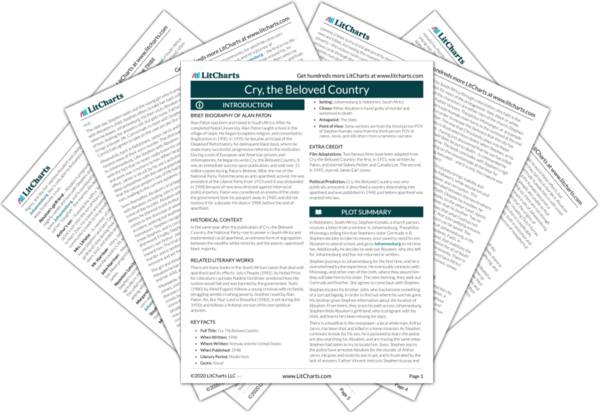Summary
Analysis
Arthur’s funeral is held a few days later. The church is filled with people from every walk of life, every race. This is the first time that James and Margaret have been in the same church as such people. The service is beautiful, and many wonderful things are said about Arthur. James again thinks of his son as a stranger—a stranger of whom he is proud. After the funeral is over, James and his wife shake hands with everyone, and it is the first time they’ve ever done so with black people.
That James could live his entire life in South Africa and never shake hands with a black person hits home just how segregated the country already is. James is coming to know his son in death in a way he never did in life.
Themes
Back at the house later that evening, Mr. Harrison sits with James. They smoke and have a drink and continue discussing the crime situation in Johannesburg. Mr. Harrison expresses firm, conservative views on the issues surrounding the black population. He expresses exasperation that they would ask for higher wages in the mines, because if they were paid more money, then the mines would close. He goes on like this for a moment before John Harrison comes in, and continues until James insists that he has to go up to bed, to be with Margaret. Mr. Harrison seems embarrassed that he had been ranting on so, but James assures him that it was good to talk to him. Mr. Harrison reiterates that though he didn’t agree with Arthur, he respected him deeply.
Mr. Harrison demonstrates one version of white attitudes in South Africa, a conservative one that is sympathetic with the injured whites and the companies, without real consideration for the plights of or crimes committed against the blacks. Mr. Harrison's repeated comment that despite disagreeing with Arthur he respected him indicates that, beyond Arthur's politics, he was also a good and decent man, who could make his points to those who disagreed with him in ways that did not create anger.
Themes
The next day, James awakes to the news that the servant who had been knocked unconscious at Arthur’s home was awake and had identified some details about the killer that was leading them on the path toward his identity. Mr. Harrison also gives James the manuscript that Arthur had been working on when he died. James sits down and reads it. It discusses how white men make many “Christian” excuses for oppressing the black population. Arthur insists that this is deeply hypocritical, that the nation is not made up of Christians but rather of cowards.
Soon after learning that his son’s killer is being tracked, James begins to see the many problems with the model of race relations that he has always taken for granted in the country. As the police track Arthur's killer, it is almost as if James is tracking Arthur himself through his writing.
Themes
Mid-sentence, the manuscript ends. James ponders the ideas that Arthur had written there, and feels like he is beginning to understand him better. Then, James realizes, Arthur had gotten up to investigate the noise and been killed at the middle of that very sentence, and he is seized with grief. He is interrupted by Margaret coming in to make sure he’s all right. He tells her that he has been reading their son’s work and thinking, and encourages her to read it, too.
The more James reads, the better he understands his son. The tragedy of Arthur’s particular life being cut short, in relation to the importance of his work, is emphasized by the fact that he was literally killed mid-sentence.
Themes
Get the entire Cry, the Beloved Country LitChart as a printable PDF.













